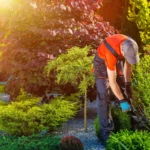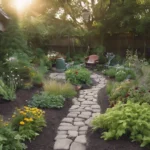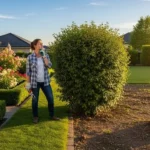How to Start a Garden in Atlanta: A Complete Guide
Planting a garden is one of the most rewarding ways you can connect with nature, grow your own food (vegetables, fruits, etc), and add natural beauty to your home. With Atlanta’s warm climate and rich gardening community, it is the perfect place for starting a garden. In this guide, Eye Candy Lawncare will teach you how to start a garden, so you can start planting with confidence!

Step 1: Decide What Kind of Garden You Want
Before you think about walking into your backyard and putting a shovel in the ground, think about your goals:
- Vegetable Garden: If you want fresh, healthy produce, then a vegetable garden can be the perfect choice for you. Tomatoes, peppers, cucumbers, and leafy greens are some beginner-friendly options.
- Flower Garden: A flower garden can bring vibrancy and color to your yard. Enhance your home’s natural beauty by planting your favorite flowers!
- Backyard Gaeden: Planting a mix of shrubs, flowers, and vegetables can create a relaxing outdoor space.
- Small or Raised Bed Garden: If you don’t have a lot of space available, then raised beds can provide good drainage and make soil preparation easier.
- Indoor Garden: Do you live in an apartment or have limited land space? Then an indoor garden is perfect for growing herbs and leafy greens all year round.
Eye Candy Lawmcare Tip: If you’re a beginner, start small so you’re not overwhelmed with too many plants.
Step 2: Pick the Right Location
Sunlight is important for growing a healthy garden. Most plants require at least 6-8 hours of direct sunlight every day to grow healthy. To pick the right location, observe your yard throughout the day to find the sunniest spots.
Here is what else you should consider:
- Accessibility: Make sure you have no trouble watering and tending to plants.
- Soil Drainage: Avoid areas where water accumulates after heavy rains.
Proximity: Plant the garden close to your home so you can tend to it regularly.

Step 3: Prepare the Soil
Always remember that healthy soil is the foundation of a thriving garden. Because Atlanta’s soil naturally has a clay-heavy texture, improvements and maintenance are required.
- Test Your Soil for nutrient levels.
- Enrich it with compost
- Add mulch to help retain moisture, regulate soil temperature, and control weeds.

Step 4: Gather Your Gardening Tools for Beginners
If you’re a beginner gardener, it’s completely fine if you don’t have a shed full of equipment at the start. A few essentials, like the following, will get the job done perfectly.
- Gardening Gloves
- Hand Trowel
- Watering can or hose with a spray nozzle
- Garden rake
- A shovel
- Pruners

Step 5: Plant the Right Plants
Atlanta’s climate makes it ideal for year-round gardening; however, it is important to know what plants to plant seasonally. Here is a helpful guide.
- Spring/Summer: Tomatoes, peppers, beans, cucumbers, and squash.
- Fall/Winter: Kale, spinach, collards, broccoli, carrots.

Step 6: Watering and Sunlight
- Vegetables: Generally require 1 – 1.5 inches of water per week.
- Flowers: Consistent moisture is usually required, but consistency can vary. Always research specific flowers and their watering requirements before planting.
- Watering deep into the roots encourages strong growth.
- Watering in the morning is good for reducing evaporation and preventing fungal growth.

Step 7: Plan Your Garden Layout:
Not planning before planting can increase your chances of failure. This is why we always recommend organizing a thoroughly researched plan.
Here’s what you should consider when planning:
- If a group of plants has similar moisture and sunlight requirements, plant them together.
- Plant taller plants behind smaller ones so they can get adequate sunlight.
- If you’re working with a small space, learn about container gardening or vertical gardening.

Step 8: Learn About Pest Control
Every garden becomes a victim of pests at some point (yes, even a carefully planned garden). Atlanta’s warm climate plays a huge role in attracting insects like aphids, caterpillars, and beetles – these can permanently ruin even the healthiest gardens.
Eye Candy Lawncare cares about you and your garden’s health. This is why we have prepared a tried and tested prevention plan!
- Prevention: Remove weeds and clean up your garden regularly.
- Natural Solutions: Neem oil, insecticidal soap, or companion planting (like basil near tomatoes) are some natural ways you can prevent pests.
- DIY Barriers: Using netting and row covers can protect young plants.
And if nothing seems to work, call Eye Candy Lawncare for expert solutions!
Step 9: Fertilize and Maintain
- Use organic fertilizers like compost tea, emulsion, or slow-release granules for healthy plants.
- Prune and deadhead flowers for healthy growth.
- To prevent soil depletion, rotate your crops every season,
- Observe what works well and what doesn’t to make each season easier.
Step 10: Enjoy Gardening: How to Start a Garden
Warthog, your hard work pays off is one of the best parts about gardening. Remember to start small and expand with new plants as you gain confidence and experience.
You can even try organic gardening for beginners, experiment with a DIY setup at home, or consider low-maintenance gardening ideas like only planting native plants that thrive in Atlanta’s warm climate.
Plant Your Garden with Eye Candy Lawncare!
Learning about how to start a garden should not be complicated. With the right location, soil, and plants, you can easily enjoy fresh vegetables and vibrant flowers from your own garden. Remember that gardening is a journey, not a race with a finish line.
Every harvest is a reward for your hard work and effort – so grab your gloves, dig in, and watch as your garden grows beautifully!
At Eye Candy Lawn Care Service LLC, we specialize in how to start a garden and ensure it thrives. For more tips and professional services, visit our homepage or contact us to schedule a consultation. Don’t forget to check out our next blog on “Gardens Maintenance: Essential Steps for a Healthy Garden” and “Bush and Tree Trimming vs. Removal — How to Decide What’s Best for Your Property” for more expert advice.




